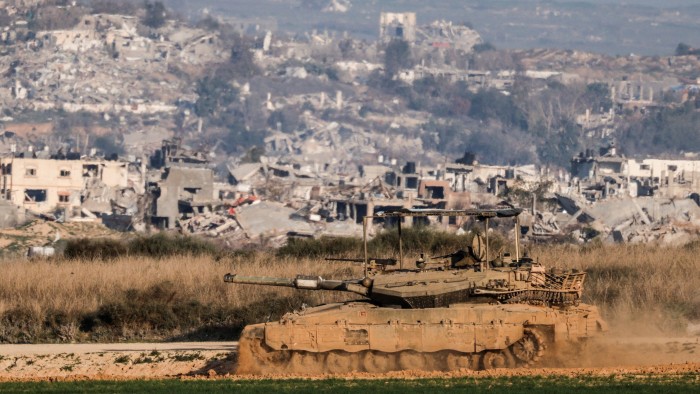Israel-Hamas ceasefire takes effect

Unlock the Editor’s Digest for free
Roula Khalaf, Editor of the FT, selects her favourite stories in this weekly newsletter.
A ceasefire between Israel and Hamas in Gaza began on Sunday, after being held up by a delay to the Palestinian militant group providing Israel with a list of the hostages due for release later in the day.
The six-week truce — the first stage of a multiphase agreement that would halt the war in Gaza and pave the way for the release of the hostages still being held in the enclave by Hamas — began almost three hours after it had been originally due to take effect at 8.30am local time (06.30 GMT).
But in an indication of the fragility of the arrangements, Israeli Prime Minister Benjamin Netanyahu said shortly before that time that it would not begin until Hamas provided Israel with a list of the three hostages to be released on Sunday.
Two hours after the ceasefire was meant to have begun, Hamas said it had now provided the names of the three women to be released. It had earlier said the delay was due to “technical reasons in the field”.
The Israeli government confirmed that it had received the names and said that the ceasefire would take effect at 11.15am local time, and that the hostages were due to be released after 16.00.
As the initial deadline for the ceasefire passed and spontaneous celebrations spread across Gaza, where many displaced people were preparing to return to their homes, Israel’s military spokesman Daniel Hagari said Israel would continue its strikes until Hamas provided the names.
Soon afterwards, the military said it had hit targets in northern and central Gaza. The Palestinian news agency Wafa reported shelling and blasts in multiple locations in the enclave and said nine people had been killed.
The multiphase deal offers the hope of a halt — and potentially an end — to the bloodiest war in the history of the Israeli-Palestinian conflict, which has left Gaza in ruins, consumed Israeli society and brought the Middle East to the brink of a full-blown war.
The fighting was triggered by Hamas’s shock October 7 2023 attack on Israel, during which militants killed 1,200 people, according to Israeli officials, and took a further 250 hostage in the deadliest day for Jews since the Holocaust.
Israel responded with a devastating assault on Gaza, which has killed more than 46,000 people, according to Palestinian officials, as well as displacing most of the coastal enclave’s 2.3mn people and fuelling a humanitarian catastrophe.
After more than half a year of failed attempts to broker a ceasefire, mediators announced last week that Israel and Hamas had agreed to a three-phase deal, which was first set out by US President Joe Biden in May last year.
The first phase involves a six-week truce, during which Hamas will release 33 of the 98 hostages still in Gaza — including children, women, the sick and elderly — in exchange for around 1,900 Palestinian prisoners.
During the first phase of the deal, displaced Palestinians will be allowed to return to their homes, including in northern Gaza. There will also be a partial withdrawal of Israeli troops from Gaza and a massive influx of humanitarian aid into the enclave.
By day 16 of the first phase, Israel and Hamas are meant to start negotiating details of the second phase of the deal, during which the remaining living hostages will be freed in exchange for hundreds more Palestinian prisoners, the complete withdrawal of Israeli forces from Gaza, and a permanent end to the war.
The final phase will involve the return of the remaining bodies of hostages who have died, as well as the beginning of the reconstruction of Gaza, under the supervision of Egypt, Qatar and the UN.
However, there are doubts over whether the deal will be implemented in full, with Netanyahu under intense pressure from far-right members of his coalition to resume the war at the end of the first stage of the deal.
On Sunday, far-right national security minister Itamar Ben-Gvir pulled his Jewish Power party out of the government in protest against the deal, reducing Netanyahu’s majority in Israel’s 120-seat parliament to just two seats.
Ben-Gvir’s ultranationalist ally, finance minister Bezalel Smotrich, has also threatened to pull his Religious Zionism party out of the government if the war does not resume after the first stage of the deal. If he did so, it would deprive Netanyahu of his parliamentary majority.
In a statement on Saturday evening, Netanyahu said the administrations of outgoing US President Joe Biden and his successor Donald Trump supported Israel’s right to resume the war if talks over the details of the second phase failed.
“If we have to return to combat, we will do so in new ways, and we will do so with great force,” Netanyahu said.
https://www.ft.com/__origami/service/image/v2/images/raw/https%3A%2F%2Fd1e00ek4ebabms.cloudfront.net%2Fproduction%2Fd1074fa2-5c60-4800-a71c-51a16adcffb2.jpg?source=next-article&fit=scale-down&quality=highest&width=700&dpr=1
2025-01-19 03:34:25




